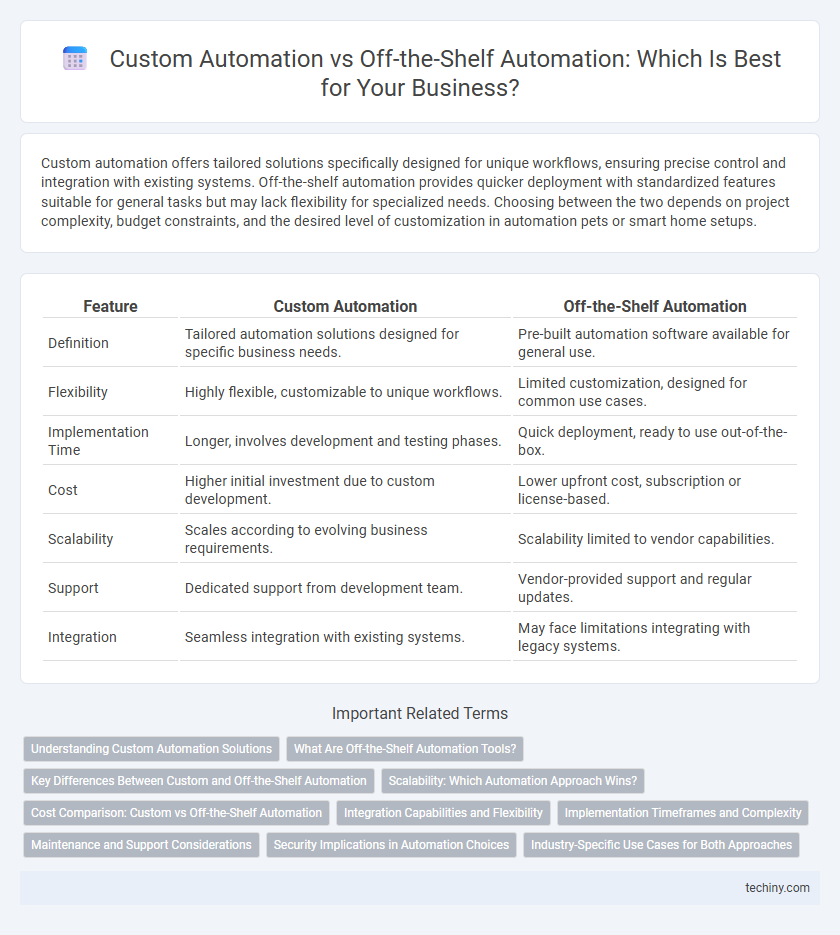Custom automation offers tailored solutions specifically designed for unique workflows, ensuring precise control and integration with existing systems. Off-the-shelf automation provides quicker deployment with standardized features suitable for general tasks but may lack flexibility for specialized needs. Choosing between the two depends on project complexity, budget constraints, and the desired level of customization in automation pets or smart home setups.
Table of Comparison
| Feature | Custom Automation | Off-the-Shelf Automation |
|---|---|---|
| Definition | Tailored automation solutions designed for specific business needs. | Pre-built automation software available for general use. |
| Flexibility | Highly flexible, customizable to unique workflows. | Limited customization, designed for common use cases. |
| Implementation Time | Longer, involves development and testing phases. | Quick deployment, ready to use out-of-the-box. |
| Cost | Higher initial investment due to custom development. | Lower upfront cost, subscription or license-based. |
| Scalability | Scales according to evolving business requirements. | Scalability limited to vendor capabilities. |
| Support | Dedicated support from development team. | Vendor-provided support and regular updates. |
| Integration | Seamless integration with existing systems. | May face limitations integrating with legacy systems. |
Understanding Custom Automation Solutions
Custom automation solutions provide tailored workflows designed to meet specific business needs, enhancing efficiency and scalability beyond generic capabilities. Unlike off-the-shelf automation, custom solutions allow integration with existing systems, offering greater flexibility and adaptability to unique operational processes. Investing in custom automation drives higher ROI by addressing precise pain points and enabling continuous optimization through bespoke features.
What Are Off-the-Shelf Automation Tools?
Off-the-shelf automation tools are pre-built software solutions designed to handle common repetitive tasks across various industries, offering quick deployment and standardized features. These tools typically come with user-friendly interfaces and regular updates, supporting processes such as data entry, workflow management, and email automation. Organizations benefit from reduced implementation time and lower initial costs, though customization options may be limited compared to bespoke automation systems.
Key Differences Between Custom and Off-the-Shelf Automation
Custom automation offers tailored solutions designed to meet specific business needs, ensuring higher flexibility and scalability compared to off-the-shelf automation, which provides standardized features suitable for general applications. Key differences include customization levels, implementation time, and cost implications, with custom automation requiring longer development and higher initial investment but delivering optimized performance aligned with unique workflows. Off-the-shelf automation enables faster deployment and lower upfront costs but may lack the precision and adaptability required for complex or evolving operational requirements.
Scalability: Which Automation Approach Wins?
Custom automation offers superior scalability by allowing tailored solutions that adapt seamlessly to evolving business needs and system integrations. Off-the-shelf automation provides quicker deployment but often lacks the flexibility to scale efficiently with complex or unique workflows. Businesses prioritizing long-term growth typically benefit more from custom automation's capacity to expand and modify functionalities without major disruptions.
Cost Comparison: Custom vs Off-the-Shelf Automation
Custom automation typically involves higher upfront costs due to tailored design, development, and integration, but offers long-term savings through optimized performance and scalability. Off-the-shelf automation solutions have lower initial expenses and quicker deployment but may incur additional costs over time for customization, licensing, and limited flexibility. Evaluating total cost of ownership (TCO) reveals that custom automation can provide better ROI for complex or unique operational needs compared to standard off-the-shelf products.
Integration Capabilities and Flexibility
Custom automation offers superior integration capabilities by allowing tailored connections with existing systems, ensuring seamless data flow and process synchronization specific to an organization's unique workflows. Off-the-shelf automation provides standardized integration options that can address common applications but often lack the flexibility required for complex or specialized environments. Businesses demanding high adaptability and deep system interoperability typically benefit more from custom automation solutions.
Implementation Timeframes and Complexity
Custom automation solutions typically require longer implementation timeframes due to tailored development, complex integration, and extensive testing phases that align with unique business processes. Off-the-shelf automation products offer faster deployment with standardized features and pre-built integrations, minimizing complexity but potentially sacrificing customization. Businesses must weigh the urgency of implementation against the need for specific functionalities when choosing between custom and off-the-shelf automation options.
Maintenance and Support Considerations
Custom automation solutions require dedicated maintenance teams familiar with specific system architectures, making support more specialized but potentially costlier over time. Off-the-shelf automation offers standardized support packages and regular updates from vendors, ensuring quicker issue resolution and lower maintenance overhead. Evaluating total cost of ownership involves analyzing long-term support flexibility, update frequency, and compatibility with existing IT infrastructure.
Security Implications in Automation Choices
Custom automation solutions offer enhanced security by allowing tailored access controls and encryption protocols specific to organizational needs, reducing vulnerabilities linked to generic configurations. Off-the-shelf automation often includes standardized security features but may expose businesses to broader risks due to uniform codebases and delayed vulnerability patches. Evaluating security implications in automation choices involves assessing potential attack surfaces, update responsiveness, and the ability to integrate with existing cybersecurity frameworks.
Industry-Specific Use Cases for Both Approaches
Custom automation solutions excel in addressing unique industry-specific challenges by tailoring workflows, integrations, and functionalities to exact operational needs, enhancing efficiency in sectors like manufacturing, healthcare, and finance. Off-the-shelf automation tools offer scalable, cost-effective solutions with quick deployment, ideal for standard processes in retail, customer service, and marketing, where flexibility is less critical. Evaluating industry demands and process complexity determines whether bespoke or pre-built automation maximizes productivity and return on investment.
Custom Automation vs Off-the-Shelf Automation Infographic

 techiny.com
techiny.com